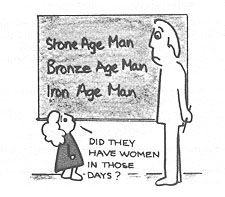 —Miller, Casey, and Swift, The Handbook of Nonsexist Writing (19)
—Miller, Casey, and Swift, The Handbook of Nonsexist Writing (19)
What is a “hag”? Is it “politically correct” to use this term?
hag:
1. An ugly old woman. 2. A witch : sorceress. 3. A woman demon.
—Webster’s Dictionary
hag:
Avoid because of its current pejorative meaning. Note, however, that this word’s root and older meanings were not derogatory–they referred to a mature wise-woman.
—Rosalie Maggio, The Nonsexist Word Finder: A Dictionary of Gender-Free Usage (58)
hag:
Originally “Holy Woman,” a cognate of Egyptian heg, a predynastic matriarchal ruler who knew words of power. Old English haegtesse, Old High German, hagzissa, which meant “harpy, witch,” or Female demon, an ugly repulsive old woman. It also formerly meant “an evil or frightening spirit” or “nightmare.” One must ask though ” ‘Evil’ by whose definition? ‘Frightening’ to whom? Whose nightmare?” Feminist contemporary definition derives from this archaic past. Hags may now be considered wise women of independent spirit.
—Cheris Kramarae and Paula Treichler, A Feminist Dictionary (185)
hag:
Archaic: a Witch, Fury, Harpy who haunts the Hedges/Boundaries of patriarchy, frightening fools and summoning Weird Wandering Women into the Wild.
—Mary Daly with Jane Caputi, Webster’s First New Intergalactic Wickedary of the English Language (137)
Required Readings
- Weedon, Ch. 4: “Language and Subjectivity” (71-103)
- Pauwels, “Linguistic Sexism and Feminist Liguistic Activism” (550-570), in Holmes’ and Meyerhoff The Handbook of Language and Gender
- Maggio, The Nonsexist Word Finder: A Dictionary of Gender-Free Usage [Course Reserves]
- Kramarae and Treichler, A Feminist Dictionary [Course Reserves]
- Daly, with Jane Caputi, Webster’s First New Intergalactic Wickedary of the English Language [Course Reserves]
- Hedley, “Surviving to Speak New Language: Mary Daly and Adrienne Rich” [Moodle2]
- Hardman, “‘And if We Lose Our Name, Then What About Our Land?’ or, What Price Development?” [Moodle2]
- Native Tongue: Chapters 9-11 (101-135)
Optional Readings
- Cameron, Feminism and Linguistic Theory: Chapter 6 [Moodle2]
- Treichler, “From Discourse to Dictionary” (in Frank and Treichler, Language, Gender and Professional Writing) [Moodle2]
- Daly, Gyn/Ecology:
Preface (to the first edition)
Introduction: “The Metapatriarchal Journey of Exorcism and Ecstasy” (defines major terms she uses, like Background and foreground, and in the section “The Purpose, the Method, the Style of this Book,” provides useful descriptions of and justifications for how she plays with language–e.g., neologisms, hyphenating words, unusual capitalization, etc.)
Chapter 8: “Spooking: Exorcism, Escape, and Enspiriting Process” (provides critique of passive voice, masculine generic, “crippling of thinking–mindbending–by lack of words,” etc.) [Moodle2]
Additional Resources
- The Nonsexist Word Finder Summary
- Guidelines for Nonsexist Language Usage, from Language, Gender, and Professional Writing
- Sample journal entry 1
- Sample journal entry 2
- Sample journal entry 3
Other Works by These Authors
- Daly, Mary
The Church and the Second Sex
Pure Lust - Hardman, M. J.
Hearing Many Voices
The Aymara Language in Its Social and Cultural Context : A Collection Essays on Aspects of Aymara Language and Culture - Kramarae, Chris (editor)
Technology and Women’s Voices: Keeping in Touch
Routledge International Encyclopedia of Women: Global Women’s Issues and Knowledge (Four-volume set) - Maggio, Rosalie
The Beacon Book of Quotations by Women
How to Say It: Choice Words, Phrases, Sentences and Paragraphs for Every Situation
Talking About People: A Guide to Fair and Accurate Language - McConnell-Ginet, Sally
Meaning and Grammar: An Introduction to Semantics
Text and Context : Cross-Disciplinary Perspectives on Language
Due This Week
Weekly journal entry including main points from readings, major points about language treated by Elgin in Native Tongue, and observations about language from daily life.
Nonsexist Usage Exercise
Assignment on Feminist Dictionaries
**Term paper topic proposal and beginning annotated bibliography due**